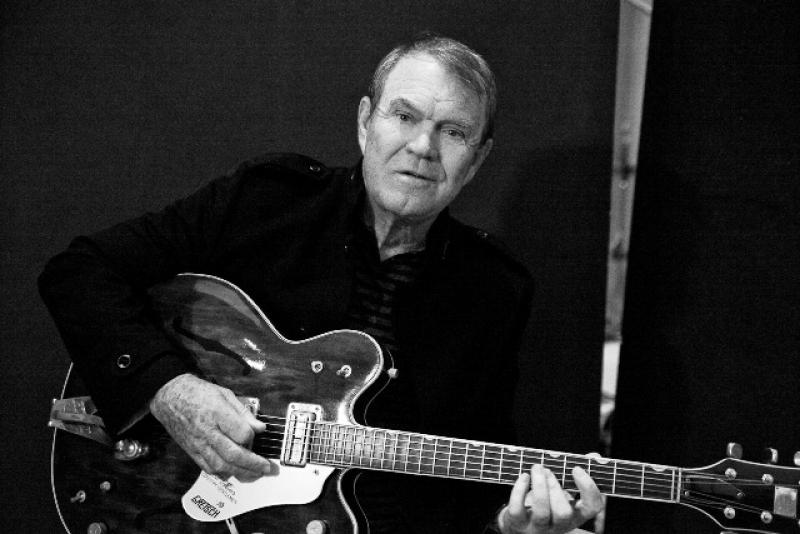


Although there was no shortage of interview clips with Glen Campbell [who has died at the age of 81] in this fine overview of his career, the tragedy was that archives were so heavily drawn on. Tragic because pop-country stylist Campbell has Alzheimer’s and is limited in what he can contribute.
Campbell was a British chart and television fixture from the late Sixties into the Seventies – more so in America - and achieved what few singers and players with country roots were able to do: he crossed over. The world of pop was as much his as the world of country. His last solo album, 2011’s Ghost on the Canvas, was acknowledged as his last and was accompanied by farewell live dates, which came to an end last year. Ghost on the Canvas shared the poignancy of Johnny Cash’s likewise Rick Rubin-produced American Recordings, and similarly tackled contemporary material.
There’s much more to Campbell than the hits, his diagnosis and the headlines surrounding his 2003 drunk and hit-and-run driving charge. Born to Irish/Scottish parents in Arkansas, he began on the bottom rung of white society in the rural south [3]. His family were sharecroppers, picking cotton for a pittance. Music, though, was “part of what he crawled out of the cradle doing.” One look at the piercing eyes captured in a black and white photo of him showed there was obviously something to this kid.
Campbell was troubled. Drugs and drink beckoned. He had stormy relationships, notably with sassy country minx Tanya Tucker
At 14, he toured with his uncle’s band, on guitar. At 16, he was in his aunt’s band. At 20, he was married with a kid of his own and living in Albuquerque. A fortuitous meeting with Jerry Fuller of “Tequila” hitmakers The Champs was followed by upping sticks to LA and joining the band (although it was heard, Campbell did not play on “Tequila”). Campbell soon tried his luck on 45. His formidable prowess on guitar led him to become a session player. His countless appearances include The Righteous Brothers’ “You've Lost That Loving Feeling”, Frank Sinatra's "Strangers in the Night” and sundry Elvis and Monkees' tracks.
During the first half of the Sixties he was a regular on California’s TV pop shows, backing others and singing the hot hits of the day. His reputation was so good that he replaced Brian Wilson for a while in The Beach Boys. The favour was returned by Wilson, who wrote the fabulous flop single “Guess I’m Dumb” for him. Unlike most sessioneers, he wasn’t shy about stepping forward. His own releases being serial stiffs didn’t hold him back either.
In 1967 he found John Hartford’s “Gentle on My Mind”. It didn’t hit big on the mainstream charts, but it did win 1967’s Grammy for the Best Country and Western Record (a landmark not mentioned here). On his way now, he co-opted the art-pop songs of Jimmy Webb and soon crossed over into the mainstream. Although the Webb and Campbell partnership has endured, a fallow patch ended with 1975’s Larry Weiss-penned “Rhinestone Cowboy”. Somehow, Campbell found time to act alongside fellow Republican John Wayne in True Grit – a performance rated by no one here, apart from the film’s lyricist Don Black.
Campbell was troubled. Drugs and drink beckoned. He had stormy relationships, notably with sassy country minx Tanya Tucker. Despite the upheavals, he’s never stopped. The ever-loquacious and always twinkly Webb spoke about him with great affection, and was almost as much the star of this programme as Campbell himself. The Monkees [4]’ Micky Dolenz is obviously also very fond of Campbell. After watching this, it was impossible not to share their regard. Even if Alzheimer’s [5] had not come along, you know they would have thought the same.
Watch Glen Campbell perform the Brian Wilson-penned and produced "Guess I’m Dumb"
Links
[1] https://theartsdesk.com/users/kieron-tyler
[2] https://www.addtoany.com/share_save
[3] http://www.theartsdesk.com/new-music/sweet-home-alabama-southern-rock-saga-bbc-four
[4] http://www.theartsdesk.com/new-music/he-was-more-monkee-davy-jones-1948%E2%80%932012
[5] http://www.theartsdesk.com/tv/fear-channel-4
[6] http://www.amazon.co.uk/Glen-Campbell/e/B000AP9YH0/ref=sr_tc_2_0
[7] https://itunes.apple.com/gb/artist/glen-campbell/id70412
[8] https://theartsdesk.com/node/17191/view
[9] https://theartsdesk.com/node/71362/view
[10] https://theartsdesk.com/node/38795/view
[11] https://theartsdesk.com/node/3725/view
[12] https://theartsdesk.com/node/81994/view
[13] https://theartsdesk.com/new-music
[14] https://theartsdesk.com/tv
[15] https://theartsdesk.com/topics/reviews
[16] https://theartsdesk.com/topics/america
[17] https://theartsdesk.com/topics/1960s
[18] https://theartsdesk.com/topics/1970s
[19] https://theartsdesk.com/topics/bbc-four
[20] https://theartsdesk.com/topics/country